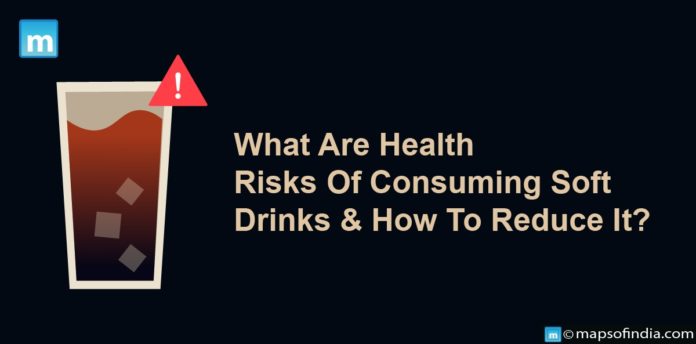Soft drinks are popular among all ages around the world. Every celebration feels incomplete without soft drinks. Be it birthday parties or wedding ceremonies, guests at homes, or players at a football field, be it with Samosas or alcohol, Soft Drink helps with everything. They are a go-to refreshing treat at all events, thanks to convenience and affordability. Companies associate soft drinks with every positive emotion, from fun to happiness to bravery. It has become an ever-present part of our daily lives, appearing almost everywhere. Restaurants, hotels, cinema halls, college canteens, metro stations, bus stations, trains, airplanes, you can’t escape soft drinks.
However, there are growing pieces of evidence showing that consuming soft drinks negatively impacts our health. The ingredients that make up a bottle of soft drink are very harmful if consumed regularly. Soft drinks have very high sugar content, which is a big concern. Average soft drinks have more than 85 grams of sugar, up to 15 teaspoons. That is over half the recommended daily intake for adults, 25 grams or six teaspoons. We all know that consuming excess sugar can lead to several health issues. In addition to high sugar, soft drinks contain various acids harmful to our organs, such as the stomach and liver. There are different other toxic chemicals used in the manufacturing of these drinks.
Health Risks of Consuming Soft Drinks
-
Obesity and weight gain
Soft drinks have a high amount of sugar and calories, which can increase weight and make regular consumers obese. Scientific study shows that people who consume 1-2 soft drinks per day are more likely to turn obese than those who do not consume at all.
-
Type 2 diabetes
Being a significant source of added sugar, it is a given that soft drinks can increase the risk of diabetes. Type 2 diabetes is a condition that affects the processing of glucose in our body.
-
Heart Disease
Drinking soft drinks regularly raises blood sugar levels and increases inflammation. This increases the risk of heart disease in the consumer.
-
Dental Problems
The acidic nature of soft drinks can result in enamel erosion, leading to cavities and other dental problems, especially in children.
-
Cancer
Certain studies, like the Cancer Epidemiology, Biomarkers & Prevention Journal, show that drinking soft drinks can increase the risk of certain types of cancer, such as breast cancer and colon cancer.
Tips for Reducing Soft Drinks Consumption
Consumers must be concerned about the health risks associated with soft drinks. Here are some steps you can take in your daily life to avoid such health risks:
- You must limit your soft drinks intake and try to avoid them as much as possible.
- You should replace soft drinks with water, unsweetened tea, or coffee.
- You can also shift to diet soft drinks, but remember that these drinks still contain artificial sweeteners, which have potential health risks.
- You can make refreshing drinks at home, such as fruit juices, shakes, smoothies, or iced tea.
To conclude, we must try to decrease soft drink intake daily. It’s time that we serve guests homemade refreshing drinks or juices. Instead of drinking soft drinks with food, we just drink water. We must replace soft drinks with all the healthier alternatives listed above and enjoy a much better soft drink-free lifestyle.





